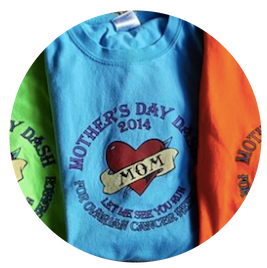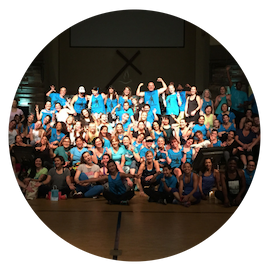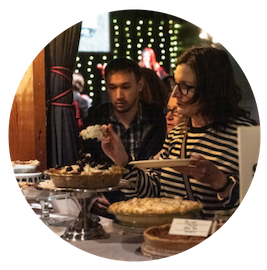As the annual Swedish SummeRun & Walk for Ovarian Cancer approaches, we wanted to share some fun and creative ways participants have been raising money for their SummeRun teams.
Host a Silent Auction
Kevin Westrick and his daughter, Whitney, started Rockin’ for Rosie in 2014. The event is in honor of Kevin’s mother, Rosemarie “Rosie”, who passed away in December 2012 after a 2.5 year battle with ovarian cancer. Since her passing, Kevin and Whitney (along with Kevin’s dad, Ed) have continued the fight in honor of Rosie. Their mission is to raise funds, awareness, and educate people about ovarian cancer, a deadly and under-funded disease. This year’s event will be on July 6th, 2019 in Kalama, WA at Poker Pete’s Tavern.
Now in its fifth year, Rockin’ For Rosie has raised over $23,000 in total. Last year alone, the event raised more than $5,500 — with all proceeds going to the Rivkin Center’s 2018 SummeRun & Walk. The fundraiser featured 60 silent auction items, had over 150 attendees in Kalama, Washington, and featured live music.
How much they’ve raised: Over $5,500 in 2018
Organize a Running Event
Since 2010, the Conklin Family hosts the Mother’s Day Dash. The Dash is a 4-mile run/walk community fundraising event for the Swedish SummeRun & Walk to benefit the Rivkin Center.
The Conklin’s are longtime supporters of the SummeRun and participate each year in honor of Shelby Conklin, an ovarian cancer survivor. Shelby was the 2017 SummeRun Honoree, 20 years after her original diagnosis.
“Our family continues to raise money with the goal of offering hope for the eradication of this heinous disease, so that no other woman and her family will have to go through it,” Shelby said.
How much they’ve raised: Nearly $5,000 in 2018
Arrange a Donation-Based Zumba, Yoga or Cycling Class
This year, Tricia Voss hosted a Zumbathon in Jacksonville, Florida in memory of her sister, Mary Pittari, and to benefit Team Mary’s Messengers. 140 people danced and helped spread awareness of ovarian cancer in Jacksonville. Team Mary’s Messengers have been participating in the SummeRun for several years.
If you attend a regular fitness class or know the owners of a fitness studio, ask them if they’d be interested in partnering to host a donation-based class that could help you raise money for your SummeRun team and them attract new clients.
How much they’ve raised: Nearly $3,000 in 2019
Other Fundraising Ideas
- Golf Tournament (like Lynn’s #FightLikeFallows Golf Tournament on June 21, 2019)
- Pie Party or Bake-Off (like the annual Pie Party in Seattle)
- Bowling Tournament
Learn More
Need more ideas or have questions about hosting a fundraising event to support your SummeRun team? Email Julie Anderson, Development Manager at the Rivkin Center, for more information.
[button size=”medium” style=”primary” text=”Donate to SummeRun” link=”https://www.summerun.org” target=””]




